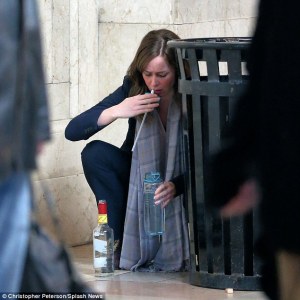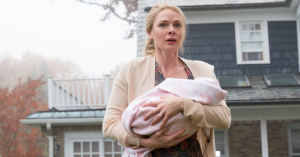
Let's not beat around the bush on this one - "The Girl on the Train" owes all of its success to "Gone Girl."
"Gone Girl" did a great many things - Relaunching the acting career of Ben Affleck outside of the films he directed, told a story that most people have said was far more compelling than the book, and most importantly, revitalized the domestic thriller/mystery genre. Movies like "The Gift" were popular because they took the intrigue that "Gone Girl" started - presenting a flawed marriage and showing how it took a disgusting turn, only to slowly show that both sides played equal parts in the anarchy so nobody comes out clean - and only slightly tweaking it to fit the new films' needs. While "The Gift" was an effective domestic thriller with an off-putting performance from Joel Edgerton, it really tried so hard to be like "Gone Girl" that it never got its own identity.
"The Girl on the Train" falls into the same category as "The Gift," as it slightly plays with some elements of "Gone Girl" but still keeps the same style and atmosphere, as well as similar plot points.
Rachel Watson (Emily Blunt) takes the train to and from work every day, and uses her time on the train to look at the lives of a seemingly-happy and perfect couple and imagines what their lives are like. This couple lives down the road from where Rachel use to live with her ex-husband, Tom (Justin Theroux), a house he still lives in with his new wife Anna (Rebecca Ferguson) and their newborn baby. But when Rachel spies on the wife, Megan (Haley Bennett), kissing another man on her porch, this infuriates her and sends her on a blind drunken rampage.
The next day, Rachel wakes up covered in blood and has no memory of what happened the night before. Shortly after that, Megan turns up missing and the police begin searching for her, including asking Rachel if she has any information on where she might have gone. The police begin to narrow down the suspect list to two - Rachel and Megan's dominating husband Scott (Luke Evans).

One of my biggest complaints with "The Girl on the Train" is its framing device. The film shows not only the perspective of Rachel, but also focuses on the perspectives of Megan and Anna. Rachel goes through most of the film unaware of what happened that night, due to her drinking problem, and wants to put the pieces together to show that she's innocent. But even she's skeptical about being the murderer.
Anna's point of view always shows Rachel as a obsessed drunk who can't let go of the past. We never see Anna do much outside of taking care of her baby, and casting death glares at Rachel. She is always afraid that Rachel will break into the house, steal their kid and do unspeakable things to her, all to get back at her ex-husband. From the moment she hears about what happened to Megan, she already has it in her mind what happened.
Megan's story is mostly told through flashback, as she tries to figure out what she wants with her life. While she admits to being sex-obsessed and not afraid to cheat on her husband, Megan is mostly portrayed as the innocent soul who never wanted to hurt anyone and just wanted the best she could get. Her death is meant to be tragic and that only a monster could have done this.

The reason this is all a problem is because of how biased it is. Before we even have a chance to fully analyze the situation, before we're introduced to even a shred of doubt, Rachel being the murderer is forced down our throats from all angles. Megan is too kind to most people to have someone kill her, so only Rachel being in a drunken rage makes sense. Anna hated Rachel from the beginning and blames every bad thing in that neighborhood on her. Even Rachel herself isn't sure if she did it or not.
At least Ben Affleck's character in "Gone Girl" knew from the start that he didn't kill his wife. It's just that he couldn't come up with enough evidence to convince everyone else of that.
This makes the mystery of "The Girl on the Train" one-sided and predictable - Every character in the movie is sure of who the murderer is before all the evidence is given to us. The filmmakers try to pass off that all three women's stories are interconnected and they all played an active part in this, when it was all one big misdirection.
I've heard the novel of "The Girl on the Train" does a better job at juggling the three perspectives, to the point where the reader is unclear on who to trust. I can see where the movie was trying to go with this, attempting a "Rashomon" effect, but it did not work at all here. This is not three different stories of the same event, but rather three points of view forming one story. Everything we're told is considered the truth without any shade for ambiguity. This makes the story and framing device for "The Girl on the Train" rather off-putting and forced.

Overall, "The Girl on the Train" has some nice atmosphere and good outdoor cinematography, for the little it does go outside, and Emily Blunt does give a nice performance as a drunk looking for redemption, but the story far too focused on making Rachel out to the bad guy that it doesn't give the audience any room to think and observe. I'll remember this one as another attempt to capture what "Gone Girl" started, and mostly failing at it.
Final Grade: C-

No comments:
Post a Comment